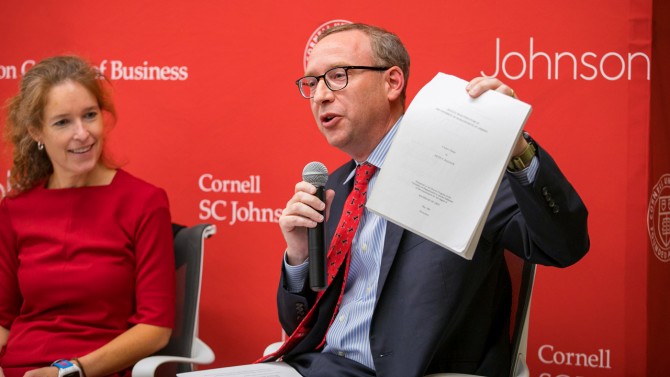
Michelle Duguid, associate professor of management, speaks during the gender pay equity panel event Sept. 18 in Sage Hall. Looking on at left is MBA student Priyasha Chaturvedi.
Pay equity panel examines persistent gender wage gap
By Sherrie Negrea
Not only does the salary gap for women persist, but the positions most women are hired for tend to be concentrated in lower rungs of companies, contributing to the wage disparity, said Cornell researchers speaking at a gender pay equity panel discussion, Sept. 18 in Sage Hall.
The panel was sponsored by the Samuel Curtis Johnson Graduate School of Management’s Office of Diversity and Inclusion, and was moderated by representatives of two student groups: MBA candidates Priyasha Chaturvedi of the Women’s Management Council, and Jack Moriarty of the Johnson Allies for Women.
Panelist Susan Fleming, M.S. ’08, Ph.D. ’10, worked on Wall Street for 12 years and has served on the board of directors of seven public companies. “I’ve spent my whole business career being virtually the only woman in the room,” she said.
Fleming said returning to Cornell to research gender bias as a Ph.D. candidate “really helped me go back and reinterpret my own experience and sort of understand, ‘Oh, that’s what was going on. I wasn’t always the problem.’”
One of the root causes of the wage gap is the way girls and boys are steered toward different careers in school, said Kevin Hallock, dean of the Cornell SC Johnson College of Business and professor of strategy and business economics. Hallock and his wife attended high school together in the mid-1980s; a guidance counselor once suggested to his wife that she not take calculus “because it’s kind of hard,” Hallock said the counselor told her.
The same counselor encouraged Hallock to take the course.
“Hopefully those sorts of things aren’t happening anymore, but it’s clear that girls and boys are taught differently and treated differently, which is a really big issue,” said Hallock, also the Joseph R. Rich ’80 Professor of Economics and Human Resource Studies, and founding director of the Institute for Compensation Studies at the ILR School.
A significant contributor to the gender wage disparity, Fleming said, is the career breaks women take to have children or care for an older parent. Since women are often earning less than their husbands, they often are the parent who drops out of the labor force to rear children or help an aging parent, she said.
“Those career breaks are really, really damaging,” said Fleming, a former senior lecturer at the School of Hotel Administration who now serves as an entrepreneur in residence at Rev: Ithaca Startup Works.
When women decide to exit the workforce, she added, it creates a “vicious cycle” that perpetuates the wage discrepancy that existed before they left their jobs.
Beyond receiving lower salaries, women also enter retirement with significantly less savings than men do, said Michelle Duguid, MS ’05, PhD ’08, an associate professor at Johnson who researches the effect of social status, power, and group relations in organizations.
“Women need to pay attention to their financial health,” Duguid said. “For us, it’s not only that we are paid less up front, but also we live longer, and so this could be a real problem.”
Students attending the presentation asked the panelists how women can overcome the wage gap once they enter the labor force. Duguid advised women to negotiate on their salaries but she emphasized that their requests must be based on proven performance and on compensation benchmarks of both men and women in their fields.
Women should also look beyond salary and focus on other forms of compensation that are being offered, such as gaining equity in a company. “That is where real wealth generation comes from – not just salary,” Fleming said.
Government can play a critical role in reducing gender pay equity, the panelists said. Fleming noted that Denmark enacted a law in 2006 that requires companies with more than 35 employees to publicly disclose the discrepancies in pay between their male and female employees.
The regulation decreased the pay gap by 7%, as companies complied with the policy primarily by slowing the growth of men’s wages, according to a study co-authored by Margarita Tsoutsoura, associate professor of finance and the John and Dyan Smith Professor of Management and Family Business at Johnson.
Another area in which the U.S. trails other countries is in providing support for parents who need child care. Of the 193 countries in the United Nations, the U.S. is one of a handful without a national paid parental leave law.
Hallock said legislation is needed because parents who would rely on paid leave are not high-income.
“I think the way to get this to work would be through legislation,” he said, “but I don’t have a lot of confidence that that’s going to happen right away.”
For a longer version of this story, visit the SC Johnson College of Business website.
Sherrie Negrea is a freelance writer.
Media Contact
Get Cornell news delivered right to your inbox.
Subscribe

